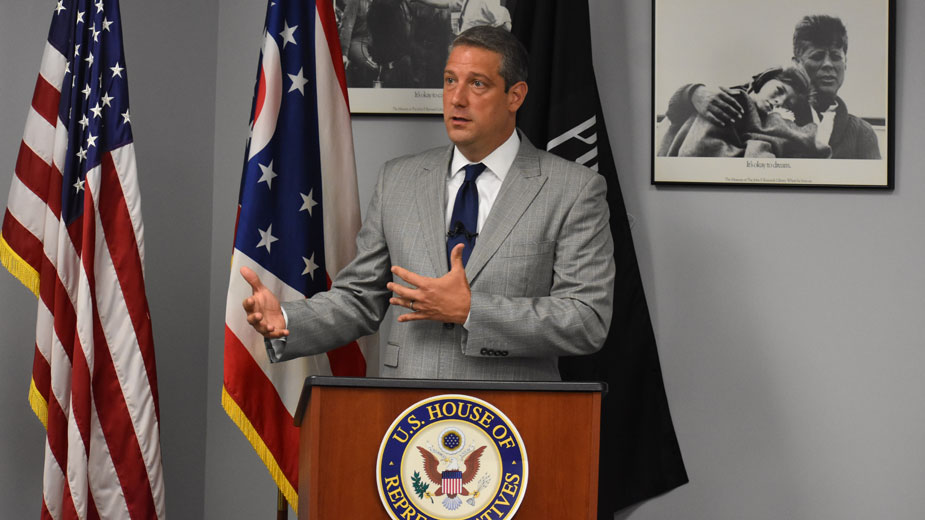Ryan Calls Relief Bill ‘Not Insignificant,’ but Says More Needed
YOUNGSTOWN, Ohio – The $900 billion in new coronavirus relief funding approved Monday by Congress is “not insignificant” but falls short of the needs of the moment, U.S. Rep. Tim Ryan said.
Ryan, D-13 Ohio, said Tuesday the package will only get the country through the next few months, and that Congress and the incoming administration of President-elect Joe Biden would have to consider further stimulus legislation early next year.
He addressed the stimulus legislation during a virtual news conference with reporters Tuesday morning.
“This package is way too late and not nearly big enough to address the big challenges that we have,” Ryan said. “This is not insignificant but it doesn’t quite get us to where we need it to be.”
Among the provisions of the stimulus package is $285 billion for additional loans through the Paycheck Protection Program. The program, which was established through the initial relief bill in late March, provided more than $789 million in assistance to 6,165 businesses in Mahoning, Trumbull and Columbiana counties, as well as $275 million to 2,399 businesses in Mercer and Lawrence counties in Pennsylvania.
Conversations are already underway between businesses and banks on applying for more funding, Ryan said, and much of the paperwork is started.
Businesses that received PPP loans previously will be eligible to apply for additional funds, but there are changes to the program. Its scope is being narrowed so big businesses won’t “gobble up all the money,” Ryan said. Applying businesses will have to show reported losses of 30% or more during the past year, and the program will be limited to businesses with 300 or fewer employees. Businesses can receive up to 2.5 times their payroll in PPP funding.
There are exceptions for restaurants, which can get up to 3.5 times their payroll and are allowed to exceed the 300-employee cap, provided a single location doesn’t cross that threshold.
The criteria puts restaurants in “a good position to be able to access that money,” he said. He met last week with about a dozen restaurant owners and all of them were “well past 30% in losses,” he reported.
Also included are $15 billion each for live entertainment venues and airlines.
Other provisions of the stimulus package include $600 direct payments to qualifying individuals, $300 enhanced unemployment benefits and housing assistance.
“We had to do something,” he said. “While it doesn’t meet the needs of the moment, it is significant for so many families.”
The direct payments are below the $1,200 checks that the federal government issued following passage of the first relief package, as are the enhanced unemployment compensation, which provided $600 in the earlier package. Ryan argues that the $2,000 monthly payments are needed in the coming months to truly boost the economy.
“I’m a little bit disappointed in that. We were able to extend unemployment and help some of these families but not really at the level that we’re seeing the need is,” he acknowledged.
He further lamented that the package lacks more targeted relief to restaurants as well as assistance for state and local governments, which have been hit by lower tax collections because so many people are unemployed or have had their hours cut due to the pandemic. Ohio was below the national average for jobs and income prior to the pandemic, which exposed and worsened those existing issues.
“People haven’t done anything wrong and then they’re faced with the issue of having to move their family out of their apartment or not get Christmas gifts for their kids,” he said. He urged landlords to be patient because assistance for their tenants was on the way.
The nation’s small business community has been “devastated” by COVID-19’s impact and has had to shoulder the brunt of it “without continued support from the federal government to keep doors open, pay employees and serve customers,” Keith Hall, president and CEO of the National Association for the Self-Employed, said in a news release Tuesday.
He praised the small business support in the package as “critical holiday relief for the struggling small business community” and “a down payment on what will be necessary in the future” to keep small businesses throughout the country from closing for good. He also said this bill can’t be the end of relief efforts.
“Small businesses are the backbone of our economy and are going to need continued support throughout 2021 and beyond if entrepreneurship is to survive as a great American ideal,” he continued.
The Ohio Restaurant Association also praised the deal, but said more help is needed beyond the Paycheck Protection Program.
“The bill will help restaurants with much needed capital that will provide more time for us to work with Congress to create the additional programs to save our beloved restaurants in cities and towns all over Ohio,” said President John Barker in a statement. “The reality is that long-term economic challenges facing independent, franchise and chain restaurants will not end with the new year, and we will continue to press federal and state leaders for additional support that will put us on a road to long-term recovery.”
Copyright 2024 The Business Journal, Youngstown, Ohio.



